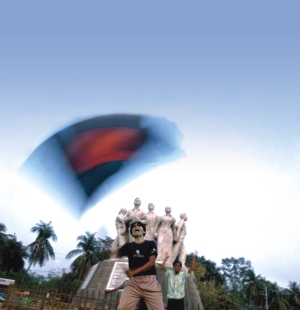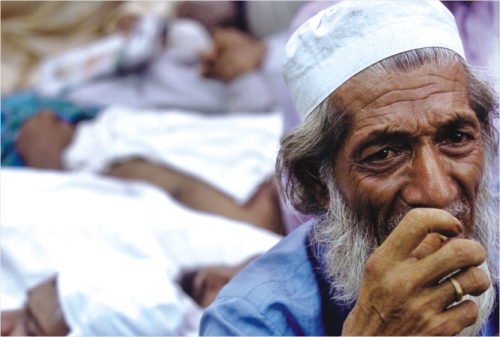
Inside
|
The Big Bang and the new state Is it possible that we are seeing the birth of a new system of one geography and several states within Bangladesh, asks Afsan Choudhury "We don't need others." The people who say this describe how they held a charity show in a remote part of North Bengal to raise enough money to send a boy to Dhaka to heal his ailing heart. Other access systems don't work so well. Nobody reaches them with health care and the so-called local government institution is non-existent: "If we depend on the official world, we can't save anyone." We discuss how villagers are running pre-primary schools as we sit next to a pair of docile cows and a few rickety posters claiming that Phulbari will be defended. The burning Bhadro sun falls on parched fields like fiery rain. So far away yet with the growth of bodies halted by hunger, we smell the revolt in the air from just-fired guns of anger. The rebellion of Kansat, the uprising of Shonir Akhra, and the Phulbari revolt have entered the collective soul, and with amazing swiftness. After the fall of Ershad, just as he is being rehabilitated in the establishment's corridors of convenience, the sight of the fury of the disenchanted looms like a huge counterpoint. Why does it draw so much attention? Bangladesh, experts and others say, is less poor than we think. Yet few are convinced, and nobody tells us who can make us smile. Once the state could control prices to some degree, but in this laissez-faire world of non-accountability the free market becomes an excuse for not keeping misery under control. If nobody can keep the prices down, of what use is the state, anyway. Might as well hand the state over to the "syndicate" or an NGO or whoever, some might say. In Bangladesh the poor brown trash are impossibly hungry. At least 25 percent of the people are half-fed, often unfed. Between 1972 and 2006, we have been able to manufacture a new category of wretched people, the extreme poor. These people own endless mouths which chew on nothing because their jaws find no food. Economic abstraction makes good fodder for seminars, but it doesn't make that much sense where the hunger grows. These people are the colour-coded poor. They carry cards to identify their status of extreme poverty. These cards, one hopes, will give them access to the facilities of the state. It's a plea, not a demand. In their world, rights have limited meaning. The system is built on occasional morsels of mercy from the state. There is a feeling that it might be best to keep a distance from the powerful. Nobody is quite sure about the grammar the state uses to talk to the poor. The evolution of round-tables, chat shows, post-editorials, and human chains as an alternative to a general system of legislative participation in running the state seems to have run its course without delivering much. However, the civil violence that just doesn't seem to go away has caused confusion in the class that is in charge of the new method of transacting with the state. Even the state is confused. People picked up bamboo sticks after shots were fired at them in Kansat, Phulbari, and Shonir Akhra, and forced the authorities to sign agreements which run counter to what they stand for. The movement was local and central political presence was incidental. At Shonir Akhra, people with sticks ran down the local MP, creating images of public resentment rarely seen before. He was at the mercy of the crowd and possibly a victim of a system unable to cope with public demand. However, people are raising angrier fists than the grammar of politics allows. This is not about the clashes at the barricades between the police and political activists asking for electoral reforms. It is about the people's own concerns, and even our ever-alert politicians are not leading such arousals. The traditional narrative of the state is simple, something we believed in in our previous years, but as time passes, views about the meaning of the state are undergoing change. The conventional notion is apparently at bay because the grammar of governance has finally failed to make enough sense. For years it might have seemed that we could ignore the storm signals of social turbulence, but now that the storm is upon us we are screaming at the top of our voices and blaming the state's inability to control things. In our nostalgia for the old state, the God-like abstraction, we are unable to connect with the new dogma of resistance, rebellion, and even death. "The poor are so poor that we can get nothing from them. They have nothing to be robbed of. If their lives improve, the criminals will go after them and that will make our lives insecure. Should we work to help them?" This is the grammar of a society's language, where impoverishment has become a protection from criminals, a collective security blanket of sorts. The poor have finally become too poor to cause any worry. But revolts are becoming richer by the day. We watched in the charring sun the people who have to grapple with the old state and a new people. A fundamental indicator to measure the distance between the two lies in the confusion over the directions of public behaviour, encounters, and violence. It's about violence by the state and violence by the people, and the objectives of both. Where did the stones that were thrown at a hapless lawmaker begin their journey? From the leaping crowd at Kansat? How far did the rage at Shonir Akhra, demanding electricity and water travel? To the crowd that wouldn't go away in Phulbari without the authorities agreeing that Asia Energy would? The crowds are not asking for Khaleda or Hasina, but demanding their rights and to be left alone. The extreme poor get no relief and seek none. Having swelled in number over the years, now perhaps as many as 30 million, they have become the largest and the most invisible population segment of this geography. But how does one argue that we and they live in the same state, when the two people are so different and matter so little to each other. They have no access to the meager resources, no livelihood guarantees or offers, no medicine, no education, no freedom from child labour or domestic violence, and they don't give dowry in case of marriage because they can't afford to pay any. They don't access the justice system, and law and order problems are beyond their pale. Barring the opportunity, or reason, to salute the national flag -- if they see one -- or to sing the national anthem -- if they have to -- the state is not the organic or even the muscular being that we love and fear. It travels down to them only in the form of trickles of relief in times of disaster and famine. Can we effectively argue that we share the same state? Some might ask what a state is for, beyond the flag waving and the saluting and singing within the skin folds of an empty belly. Can Baridhara-Gulshan-Banani ever live in the same neighbourhood where such absurd hunger lives? Does the answer lie in this strange mix of geography? Suddenly, as Dhaka took to the streets demanding elections, the people of Kansat took to the muddy roads demanding electricity. The commanding faith of the middle class in elections as a talismanic form of change is a matter of faith, and like faith not arguable. If we put all the previous elections together, could we describe the gains made? A study on the elections since the CTG system came into place that was carried out in 2004 is succinct: "There is no co-relationship between good governance and elections. Public expectation from elections as an agent of change is low because it doesn't lead to a meaningful legislature, without which good governance is not possible. Without good governance, there can be no state-driven poverty alleviation." It's difficult to imagine this 25 percent of the extreme poor population being interested in elections and by extension management systems of the state.
If they have to ask, whom should they ask? How do they know if the awesome state, demanding awe and attention along with patriotism from all, will give them an extra bowl of rice? The endless chat shows on TV and the countless round-tables have become the audio-visual culture of the new state and its new citizens. You can't reach a studio or an auditorium without the pass of approval. In the villages, the ultra poor also carry cards. It allows them to beg for mercy at the doors of the state. Two cards, two worlds. Can these be sufficient reason to accept that the state that revolves around Dhaka is the same that circulates in the fearful heat of Kurigram? Is the idea that this country may have several states in operation, markedly different from each other, with only the geography to make a common cause? Without doing "hujjat," can we put all our people in one "state" and declare that universality has been achieved ? The rural people -- community, class, etc -- are becoming more fond of each other than of the "state," because they find themselves surrounded by what isn't there. The state is most visible only when disasters strike, when "charamponthees" and "santhrashis" strike and/or are struck down in encounters. When the diesel dump is dry, the irrigation pumps don't work, and without water lands are not cultivated. Even the skies wait and the rains fly away to another land. And that is when the rage fuses into something unknown and strange which we can't understand in the traditional grammars that we know in making sense of the state. Electoral reforms are fine, but they are not what Kansat, Phulbari, or Shonir Akhra were all about. We need to ponder a possible new phenomenon where one geography accommodates several state realities. Is Dhaka becoming a new mega-state surrounded by satellite states of smaller beings? Is the recent spate of violence the Big Bang of a new politics? |

